2017-2018学年高中英语高考提能练Modules1_2仿真检测灵活拆组卷外研版必修1
2017-2018学年高中英语北师大版必修1文档:高考提能练 Unit 2 仿真检测灵活拆组卷 Word版含答案
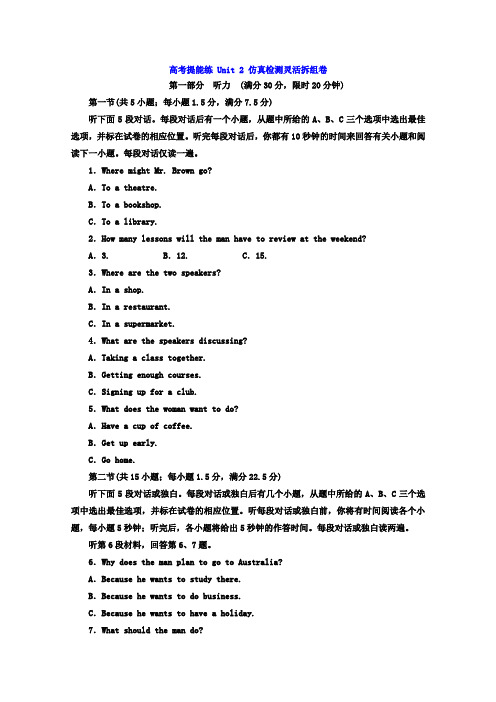
高考提能练 Unit 2 仿真检测灵活拆组卷第一部分听力(满分30分,限时20分钟)第一节(共5小题;每小题1.5分,满分7.5分)听下面5段对话。
每段对话后有一个小题,从题中所给的A、B、C三个选项中选出最佳选项,并标在试卷的相应位置。
听完每段对话后,你都有10秒钟的时间来回答有关小题和阅读下一小题。
每段对话仅读一遍。
1.Where might Mr. Brown go?A.To a theatre.B.To a bookshop.C.To a library.2.How many lessons will the man have to review at the weekend?A.3. B.12. C.15.3.Where are the two speakers?A.In a shop.B.In a restaurant.C.In a supermarket.4.What are the speakers discussing?A.Taking a class together.B.Getting enough courses.C.Signing up for a club.5.What does the woman want to do?A.Have a cup of coffee.B.Get up early.C.Go home.第二节(共15小题;每小题1.5分,满分22.5分)听下面5段对话或独白。
每段对话或独白后有几个小题,从题中所给的A、B、C三个选项中选出最佳选项,并标在试卷的相应位置。
听每段对话或独白前,你将有时间阅读各个小题,每小题5秒钟;听完后,各小题将给出5秒钟的作答时间。
每段对话或独白读两遍。
听第6段材料,回答第6、7题。
6.Why does the man plan to go to Australia?A.Because he wants to study there.B.Because he wants to do business.C.Because he wants to have a holiday.7.What should the man do?A.Answer some questions.B.Fill in a form.C.Have a test.听第7段材料,回答第8至10题。
2017-2018学年高中英语北师大版1文档:高考提能练Unit2仿真检测灵活拆组卷含答案
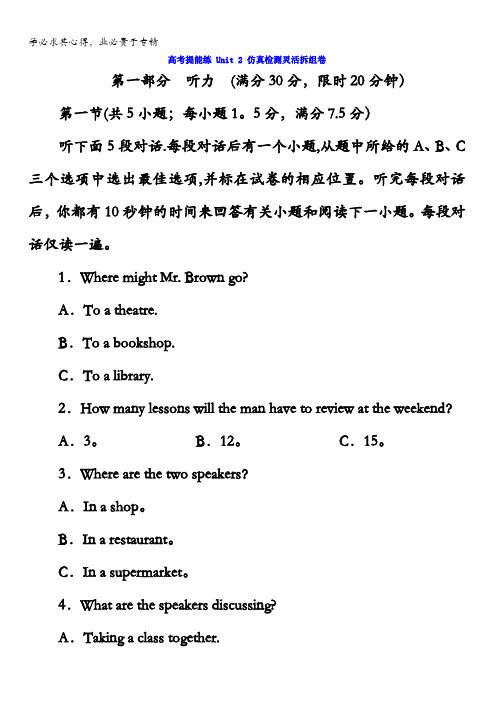
高考提能练 Unit 2 仿真检测灵活拆组卷第一部分听力(满分30分,限时20分钟)第一节(共5小题;每小题1。
5分,满分7.5分)听下面5段对话.每段对话后有一个小题,从题中所给的A、B、C 三个选项中选出最佳选项,并标在试卷的相应位置。
听完每段对话后,你都有10秒钟的时间来回答有关小题和阅读下一小题。
每段对话仅读一遍。
1.Where might Mr. Brown go?A.To a theatre.B.To a bookshop.C.To a library.2.How many lessons will the man have to review at the weekend?A.3。
B.12。
C.15。
3.Where are the two speakers?A.In a shop。
B.In a restaurant。
C.In a supermarket。
4.What are the speakers discussing?A.Taking a class together.B.Getting enough courses.C.Signing up for a club.5.What does the woman want to do?A.Have a cup of coffee.B.Get up early。
C.Go home.第二节(共15小题;每小题1。
5分,满分22.5分)听下面5段对话或独白。
每段对话或独白后有几个小题,从题中所给的A、B、C三个选项中选出最佳选项,并标在试卷的相应位置.听每段对话或独白前,你将有时间阅读各个小题,每小题5秒钟;听完后,各小题将给出5秒钟的作答时间。
每段对话或独白读两遍。
听第6段材料,回答第6、7题。
6.Why does the man plan to go to Australia?A.Because he wants to study there。
高中英语高考提能练Modules1_2仿真检测灵活拆组卷(含解析)外研版选修8
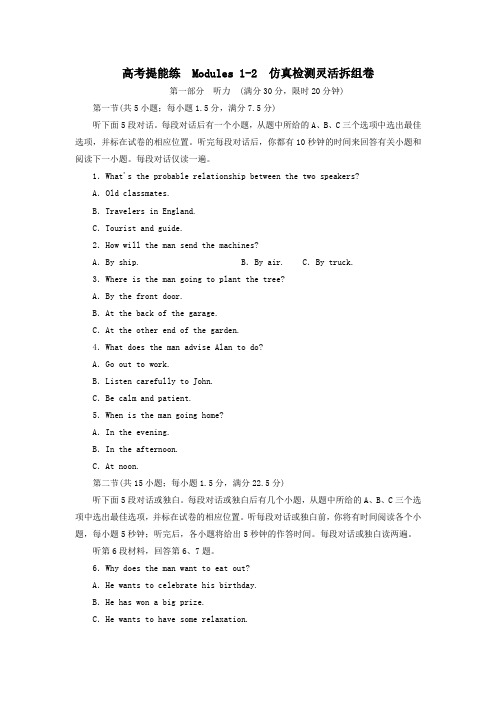
高考提能练 Modules 1-2 仿真检测灵活拆组卷第一部分听力(满分30分,限时20分钟)第一节(共5小题;每小题1.5分,满分7.5分)听下面5段对话。
每段对话后有一个小题,从题中所给的A、B、C三个选项中选出最佳选项,并标在试卷的相应位置。
听完每段对话后,你都有10秒钟的时间来回答有关小题和阅读下一小题。
每段对话仅读一遍。
1.What's the probable relationship between the two speakers?A.Old classmates.B.Travelers in England.C.Tourist and guide.2.How will the man send the machines?A.By ship. B.By air. C.By truck.3.Where is the man going to plant the tree?A.By the front door.B.At the back of the garage.C.At the other end of the garden.4.What does the man advise Alan to do?A.Go out to work.B.Listen carefully to John.C.Be calm and patient.5.When is the man going home?A.In the evening.B.In the afternoon.C.At noon.第二节(共15小题;每小题1.5分,满分22.5分)听下面5段对话或独白。
每段对话或独白后有几个小题,从题中所给的A、B、C三个选项中选出最佳选项,并标在试卷的相应位置。
听每段对话或独白前,你将有时间阅读各个小题,每小题5秒钟;听完后,各小题将给出5秒钟的作答时间。
每段对话或独白读两遍。
听第6段材料,回答第6、7题。
[K12配套]2017_2018学年高中英语高考提能练Modules1_2仿真检测灵活拆组卷外研版必修3
![[K12配套]2017_2018学年高中英语高考提能练Modules1_2仿真检测灵活拆组卷外研版必修3](https://img.taocdn.com/s3/m/4c7c6212a5e9856a5612607d.png)
高考提能练 Modules 1~2 仿真检测灵活拆组卷第一部分听力(满分30分,限时20分钟)第一节(共5小题;每小题1.5分,满分7.5分)听下面5段对话,每段对话后有一个小题,从题中所给的A、B、C三个选项中选出最佳选项,并标在试卷的相应位置。
听完每段对话后,你都有10秒钟的时间来回答有关小题和阅读下一小题。
每段对话仅读一遍。
1.What time is it now?A.It’s 4:30. B.It’s 4:50. C.It’s 5:10.2.What does the man think of the fish?A.It is tasty. B.It is spicy. C.It is salty.3.What is the man going to do?A.Finish his report.B.Borrow a computer.C.Buy a train ticket.4.Where does the conversation probably take place?A.At a restaurant.B.At the woman’s house.C.At a clothes store.5.What did David do in London?A.He went sightseeing.B.He bought some gold.C.He worked as a delivery man.第二节(共15小题;每小题1.5分,满分22.5分)听下面5段对话或独白。
每段对话或独白后有几个小题,从题中所给的A、B、C三个选项中选出最佳选项,并标在试卷的相应位置。
听每段对话或独白前,你将有时间阅读各个小题,每小题5秒钟;听完后,各小题将给出5秒钟的作答时间。
每段对话或独白读两遍。
听第6段材料,回答第6、7题。
6.Why is the man calling?A.To check the price of renting.B.To book an area for an event.C.To confirm the reservation.7.When will the man have the outdoor event?A.On Saturday. B.On Sunday. C.On Monday.听第7段材料,回答第8、9题。
18学年高中英语高考提能练Modules1_2仿真检测灵活拆组卷外研版必修4
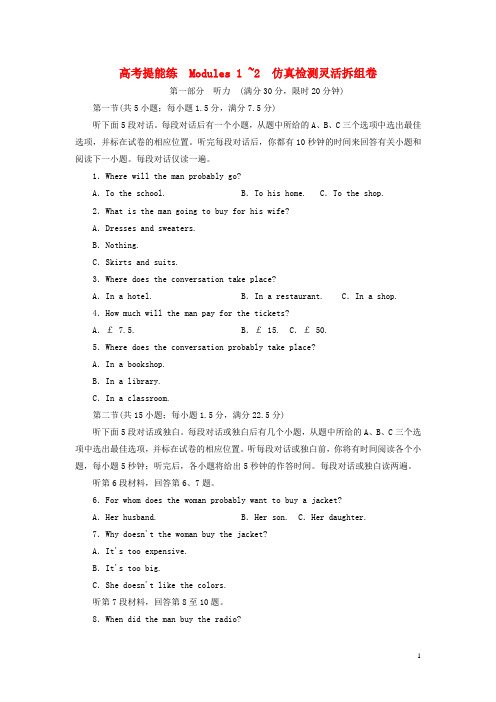
高考提能练 Modules 1 ~2 仿真检测灵活拆组卷第一部分听力(满分30分,限时20分钟)第一节(共5小题;每小题1.5分,满分7.5分)听下面5段对话。
每段对话后有一个小题,从题中所给的A、B、C三个选项中选出最佳选项,并标在试卷的相应位置。
听完每段对话后,你都有10秒钟的时间来回答有关小题和阅读下一小题。
每段对话仅读一遍。
1.Where will the man probably go?A.To the school. B.To his home. C.To the shop.2.What is the man going to buy for his wife?A.Dresses and sweaters.B.Nothing.C.Skirts and suits.3.Where does the conversation take place?A.In a hotel. B.In a restaurant. C.In a shop.4.How much will the man pay for the tickets?A.£ 7.5. B.£ 15. C.£ 50.5.Where does the conversation probably take place?A.In a bookshop.B.In a library.C.In a classroom.第二节(共15小题;每小题1.5分,满分22.5分)听下面5段对话或独白。
每段对话或独白后有几个小题,从题中所给的A、B、C三个选项中选出最佳选项,并标在试卷的相应位置。
听每段对话或独白前,你将有时间阅读各个小题,每小题5秒钟;听完后,各小题将给出5秒钟的作答时间。
每段对话或独白读两遍。
听第6段材料,回答第6、7题。
6.For whom does the woman probably want to buy a jacket?A.Her husband. B.Her son. C.Her daughter.7.Why doesn't the woman buy the jacket?A.It's too expensive.B.It's too big.C.She doesn't like the colors.听第7段材料,回答第8至10题。
18学年高中英语高考提能练Modules1_2仿真检测灵活拆组卷外研版必修1
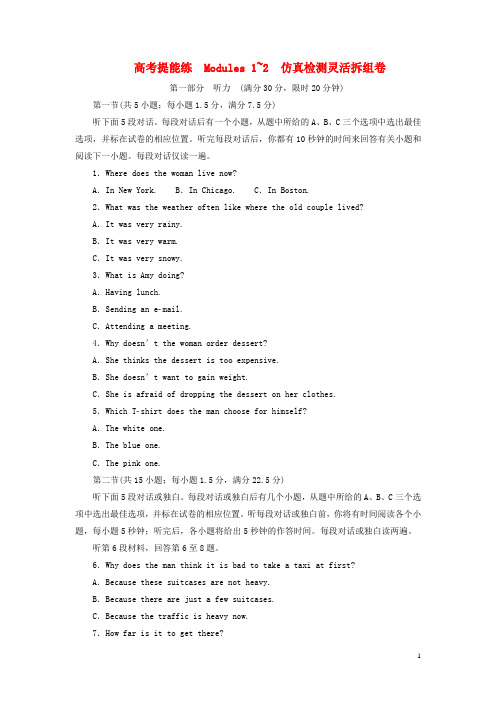
高考提能练 Modules 1~2 仿真检测灵活拆组卷第一部分听力(满分30分,限时20分钟)第一节(共5小题;每小题1.5分,满分7.5分)听下面5段对话。
每段对话后有一个小题,从题中所给的A、B、C三个选项中选出最佳选项,并标在试卷的相应位置。
听完每段对话后,你都有10秒钟的时间来回答有关小题和阅读下一小题。
每段对话仅读一遍。
1.Where does the woman live now?A.In New York. B.In Chicago. C.In Boston.2.What was the weather often like where the old couple lived?A.It was very rainy.B.It was very warm.C.It was very snowy.3.What is Amy doing?A.Having lunch.B.Sending an email.C.Attending a meeting.4.Why doesn’t the woman order dessert?A.She thinks the dessert is too expensive.B.She doesn’t want to gain weight.C.She is afraid of dropping the dessert on her clothes.5.Which Tshirt does the man choose for himself?A.The white one.B.The blue one.C.The pink one.第二节(共15小题;每小题1.5分,满分22.5分)听下面5段对话或独白。
每段对话或独白后有几个小题,从题中所给的A、B、C三个选项中选出最佳选项,并标在试卷的相应位置。
听每段对话或独白前,你将有时间阅读各个小题,每小题5秒钟;听完后,各小题将给出5秒钟的作答时间。
2017-2018学年高中英语外研版一模块综合仿真检测灵活拆组卷含答案
高考提能练模块综合仿真检测灵活拆组卷第一部分听力(满分30分,限时20分钟)第一节(共5小题;每小题1。
5分,满分7.5分)听下面5段对话。
每段对话后有一个小题,从题中所给的A、B、C三个选项中选出最佳选项,并标在试卷的相应位置.听完每段对话后,你都有10秒钟的时间来回答有关小题和阅读下一小题.每段对话仅读一遍.1.What’s John's address?A.1434 King Street。
B.1344 Queen Street。
C.1343 King Street.2.How old is the woman’s car?A.One week old.B.One month old.C.Three years old.3.How much did the skirt cost?A.$24. B.$12。
C.$6。
4.When is the man’s birthday?A.April 1st。
B.April 2nd. C.April 3rd.5.How will the woman go to New York?A.By car。
B.By train。
C.By airplane。
第二节(共15小题;每小题1。
5分,满分22.5分)听下面5段对话或独白。
每段对话或独白后有几个小题,从题中所给的A、B、C三个选项中选出最佳选项,并标在试卷的相应位置.听每段对话或独白前,你将有时间阅读各个小题,每小题5秒钟;听完后,各小题将给出5秒钟的作答时间。
每段对话或独白读两遍.听第6段材料,回答第6至8题。
6.What will there be after class?A.A sports meeting.B.A meeting。
C.A new film。
7.Who should be helped?A.Bob。
B.Helen. C.Mike。
8.Why can't the woman come?A.Because she has to visit Bob。
高中英语高考提能练Modules1-2仿真检测灵活拆组卷外研版必修2(new)
高考提能练 Modules 1~2 仿真检测灵活拆组卷第一部分听力(满分30分,限时20分钟)第一节(共5小题;每小题1。
5分,满分7。
5分)听下面5段对话。
每段对话后有一个小题,从题中所给的A、B、C三个选项中选出最佳选项,并标在试卷的相应位置.听完每段对话后,你都有10秒钟的时间来回答有关小题和阅读下一小题.每段对话仅读一遍。
1.What do we know about the man?A.He usually works at night。
B.He has got a promotion.C.He has two days off every week。
2.How does the man keep in shape?A.He never eats out。
B.He eats less food.C.He never eats after 9:00 pm.3.What are they doing now most probably?A.Cleaning the house。
B.Decorating the house.C.Choosing a flat。
4.What will the man probably do next?A.Have a taste of the salad.B.Eat some ice cream.C.Add some salt to the salad.5.Which season is it now?A.Autumn。
B.Summer。
C.Spring.第二节(共15小题;每小题1.5分,满分22.5分)听下面5段对话或独白。
每段对话或独白后有几个小题,从题中所给的A、B、C三个选项中选出最佳选项,并标在试卷的相应位置.听每段对话或独白前,你将有时间阅读各个小题,每小题5秒钟;听完后,各小题将给出5秒钟的作答时间。
每段对话或独白读两遍。
听第6段材料,回答第6、7题。
2017-2018学年高中英语 高考提能练 Modules 1-2 仿真检测灵活拆组卷 外研版必修2
高考提能练 Modules 1~2 仿真检测灵活拆组卷第一部分听力(满分30分,限时20分钟)第一节(共5小题;每小题1.5分,满分7.5分)听下面5段对话。
每段对话后有一个小题,从题中所给的A、B、C三个选项中选出最佳选项,并标在试卷的相应位置。
听完每段对话后,你都有10秒钟的时间来回答有关小题和阅读下一小题。
每段对话仅读一遍。
1.What do we know about the man?A.He usually works at night.B.He has got a promotion.C.He has two days off every week.2.How does the man keep in shape?A.He never eats out.B.He eats less food.C.He never eats after 9:00 pm.3.What are they doing now most probably?A.Cleaning the house.B.Decorating the house.C.Choosing a flat.4.What will the man probably do next?A.Have a taste of the salad.B.Eat some ice cream.C.Add some salt to the salad.5.Which season is it now?A.Autumn. B.Summer. C.Spring.第二节(共15小题;每小题1.5分,满分22.5分)听下面5段对话或独白。
每段对话或独白后有几个小题,从题中所给的A、B、C三个选项中选出最佳选项,并标在试卷的相应位置。
听每段对话或独白前,你将有时间阅读各个小题,每小题5秒钟;听完后,各小题将给出5秒钟的作答时间。
每段对话或独白读两遍。
听第6段材料,回答第6、7题。
[k12精品]2017_2018学年高中英语高考提能练Modules1_2仿真检测灵活拆组卷外研版必修3
高考提能练 Modules 1~2 仿真检测灵活拆组卷第一部分听力(满分30分,限时20分钟)第一节(共5小题;每小题1.5分,满分7.5分)听下面5段对话,每段对话后有一个小题,从题中所给的A、B、C三个选项中选出最佳选项,并标在试卷的相应位置。
听完每段对话后,你都有10秒钟的时间来回答有关小题和阅读下一小题。
每段对话仅读一遍。
1.What time is it now?A.It’s 4:30. B.It’s 4:50. C.It’s 5:10.2.What does the man think of the fish?A.It is tasty. B.It is spicy. C.It is salty.3.What is the man going to do?A.Finish his report.B.Borrow a computer.C.Buy a train ticket.4.Where does the conversation probably take place?A.At a restaurant.B.At the woman’s house.C.At a clothes store.5.What did David do in London?A.He went sightseeing.B.He bought some gold.C.He worked as a delivery man.第二节(共15小题;每小题1.5分,满分22.5分)听下面5段对话或独白。
每段对话或独白后有几个小题,从题中所给的A、B、C三个选项中选出最佳选项,并标在试卷的相应位置。
听每段对话或独白前,你将有时间阅读各个小题,每小题5秒钟;听完后,各小题将给出5秒钟的作答时间。
每段对话或独白读两遍。
听第6段材料,回答第6、7题。
6.Why is the man calling?A.To check the price of renting.B.To book an area for an event.C.To confirm the reservation.7.When will the man have the outdoor event?A.On Saturday. B.On Sunday. C.On Monday.听第7段材料,回答第8、9题。
- 1、下载文档前请自行甄别文档内容的完整性,平台不提供额外的编辑、内容补充、找答案等附加服务。
- 2、"仅部分预览"的文档,不可在线预览部分如存在完整性等问题,可反馈申请退款(可完整预览的文档不适用该条件!)。
- 3、如文档侵犯您的权益,请联系客服反馈,我们会尽快为您处理(人工客服工作时间:9:00-18:30)。
高考提能练 Modules 1~2 仿真检测灵活拆组卷第一部分听力(满分30分,限时20分钟)第一节(共5小题;每小题1.5分,满分7.5分)听下面5段对话。
每段对话后有一个小题,从题中所给的A、B、C三个选项中选出最佳选项,并标在试卷的相应位置。
听完每段对话后,你都有10秒钟的时间来回答有关小题和阅读下一小题。
每段对话仅读一遍。
1.Where does the woman live now?A.In New York. B.In Chicago. C.In Boston.2.What was the weather often like where the old couple lived?A.It was very rainy.B.It was very warm.C.It was very snowy.3.What is Amy doing?A.Having lunch.B.Sending an email.C.Attending a meeting.4.Why doesn’t the woman order dessert?A.She thinks the dessert is too expensive.B.She doesn’t want to gain weight.C.She is afraid of dropping the dessert on her clothes.5.Which Tshirt does the man choose for himself?A.The white one.B.The blue one.C.The pink one.第二节(共15小题;每小题1.5分,满分22.5分)听下面5段对话或独白。
每段对话或独白后有几个小题,从题中所给的A、B、C三个选项中选出最佳选项,并标在试卷的相应位置。
听每段对话或独白前,你将有时间阅读各个小题,每小题5秒钟;听完后,各小题将给出5秒钟的作答时间。
每段对话或独白读两遍。
听第6段材料,回答第6至8题。
6.Why does the man think it is bad to take a taxi at first?A.Because these suitcases are not heavy.B.Because there are just a few suitcases.C.Because the traffic is heavy now.7.How far is it to get there?A.Fifty minutes on foot.B.Fifteen minutes on foot.C.Fifteen minutes by taxi.8.How do they probably go there at last?A.By bus. B.On foot. C.By taxi.听第7段材料,回答第9至11题。
9.How do people react to other people’s asking for help when they are relaxing at home?A.They agree to offer help actively.B.They refuse to help other people.C.They offer help against their own will.10.Why do people offer help when they are not willing to?A.They are so kind that they don’t want to see people in trouble.B.They are afraid that they will lose friendship.C.They can’t help offering help to others out of habit.11.What should people do when facing such problems?A.Never refuse the people in need of help.B.Always say “no” to the people who need help.C.Refuse some requests sometimes.听第8段材料,回答第12至14题。
12.How does the man book his ticket?A.On the Internet.B.Through a friend.C.On the phone.13.Which city is the man leaving for?A.Houston. B.Chicago. C.New York.14.When is the man returning?A.On May 5. B.On May 2. C.On May 6.听第9段材料,回答第15至17题。
15.Where does this conversation take place?A.At home. B.In an interview. C.At a school.16.Why does the man want a new job?A.He has lost his job.B.He likes computers.C.He wants to earn more money.17.What will probably happen to the man next?A.He will be refused by the woman.B.He will work as a computer programmer.C.He will work as a cameraman.听第10段材料,回答第18至20题。
18.What do Third World countries often mistakenly decide to do?A.To open many new factories.B.To permit rapid industrialization.C.To fire workers with specific skills.19.What do the factory owners do to get maximized profits?A.They make full use of automation if possible.B.They hire as many workers as possible.C.They train workers for specific factory jobs.20.Which aspect does the speaker focus on?A.The advantages of rapid industrialization.B.The problems of rapid industrialization.C.The progress of rapid industrialization.答案:1~5 ACBBB 6~10 CBCCB11~15 CCBAB 16~20 CABAB听力材料Text 1M:Do you enjoy life in New York?W:No, I don’t. I’m planning to move to Chicago or Boston. But I’ve never regretted my earlier decision.Text 2W:Why did the old couple sell their house here?M:Because they wanted to live somewhere warm. They were tired of the snow all year round.Text 3M:Amy, lunch is ready.W:Wait for a moment. I am sending an email.M:Come on. I have to attend a meeting in half an hour.Text 4M:I think I’ll order the chocolate ice cream because I didn’t eat lunch earlier today.W:No dessert for me. I can hardly get into my jeans.Text 5M:This Tshirt is lovely. I will buy a blue one for myself and a white one for my wife.W:We also have pink ones.M:Then give me a pink one too.W:OK. The price is $10 for each.Text 6W:Fifteen minutes to get there! And these suitcases too! I think we ought to take a taxi.M:Not at this moment. Look at the traffic. It is moving very slowly. We can get there just as quickly on foot.W:Well, I can’t possibly carry this suitcase any farther.M:Let me take it.W:Don’t be silly. You can’t carry your case and mine as well.M:Yes, I can. The cases aren’t that heavy. Hum!W:You see! They’re heavier than you thought!M:Perhaps it is not a bad idea to take a taxi after all.Text 7W:I find it harder to say “no” than “yes”.M:Me too, and most people do. Sometimes when we are at home relaxing for a couple of days, our friends ask us to offer some help. We usually agree reluctantly.W:Yes. Many peopl e say “yes” to this kind of request. People tend not to consider their own interests and feelings, but are often angry with themselves afterwards.M:That’s true. Saying “no” requires courage and considerable practice, for people are afraid saying “no” migh t risk losing the friendship of the person asking for help.W:But in fact, rejecting a request can even help to keep a relationship lasting longer.M:Yes, I agree. It is better to say “no” sometimes.Text 8W:Frontier Airlines. How may I help you?M:I’m calling to make a reservation for the second of May.W:Yes, sir. Could you give me the city you’re leaving from and your destination, please?M:I’ll be departing from Houston, Texas, and flying to Chicago, Illinois.W:And when do you want to return?M:Uh, I want to come back on the fifth. Oh, and ma’am, I’d like the cheapest flight you have.W:Yes, sir. Well, if you leave at 6 am from Houston on May second, the price for the flight is $150.M:And what about from Chicago on the fifth?W:That’s also $150 if you leave at 6 am.M:Great, let’s do that. And would you have any information about places to stay? I’m going to an important meeting in the Michigan Avenue area.W:Yes, sir. But first, may I have your name?Text 9W:So, why do you want to be a computer programmer?M:Well, I don’t like working in a fast food restaurant, and I want to make more money.W:I see. Do you have any experience?M:No, but I’m a fast learner.W:What kind of computer do you use?M:Computer? Um, let me see. I can use a Mac. I also used Windows 2000 once.W:That’s good.M:May I ask a question?W:Uh huh, go ahead.M:Will I be able to find a job as a computer programmer?W:Um, er ...Text 10Third World countries often mistakenly decide to permit rapid industrialization. When this industrialization occurs, many new factories open, and workers get jobs. Unfortunately, many of these new jobs are not permanent. The leaders of an industry want their factories to be as productive as possible, and they will do anything to achieve that goal. Whenever they can, they take advantage of automation, which meansthat workers are replaced by a more efficient machine. As a result, a worker trained for a specific factory job becomes unemployed, and the profits of the factory owners are maximized.Many experts in Third World economics are concerned about rapid industrialization because it brings problems as well as progress. The leaders of Third World countries should be aware of the dangers as well as the advantages of rapid industrialization.第二部分阅读理解( 满分40分,限时35分钟) 第一节(共15小题;每小题2分,满分30分)阅读下列短文,从每题所给的四个选项(A、B、C和D)中,选出最佳选项。
